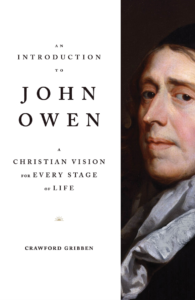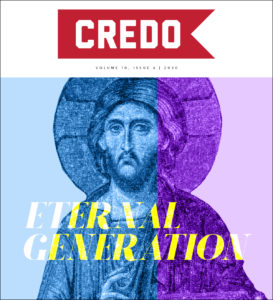As with all of his publications on John Owen, Crawford Gribben’s latest introduction is a must-have. This book continues Gribben’s cutting-edge work on situating Owen in his immediate context, questioning the status quo of previous scholarship and leading readers to ask penetrating and innovative questions. Always thinking from a chronological point of view, Gribben now traces Owen’s thought regarding the lifespan of a Christian, from childhood, to youth, to middle age, to death and eternal life.  He offers valuable descriptions of unpublished material, such as notes on Owen’s sermons, and includes a conclusion that describes and defends his approach to Owen, which he has employed in previous works but did not explicitly explain until now. The primary contribution of Gribben’s work is that it offers fresh ideas about a figure who is becoming more and more popular; yet, this also means that it is provocative and takes risks, some of which may need to be challenged in the future. For both of these reasons, anyone wanting to get serious about studying Owen must read and engage with this book.
He offers valuable descriptions of unpublished material, such as notes on Owen’s sermons, and includes a conclusion that describes and defends his approach to Owen, which he has employed in previous works but did not explicitly explain until now. The primary contribution of Gribben’s work is that it offers fresh ideas about a figure who is becoming more and more popular; yet, this also means that it is provocative and takes risks, some of which may need to be challenged in the future. For both of these reasons, anyone wanting to get serious about studying Owen must read and engage with this book.
Not surprisingly, An Introduction to John Owen opens with helpful maps and a timeline, undergirding Gribben’s goal of placing Owen in his historical context. It continues with a preface and introduction. In the former, Gribben explains that this book is as an “introduction to [Owen’s] work, but it is not an attempt at theological weight lifting. Instead, it is about Owen’s description of the spiritual lives of his readers” (13). In the latter, Gribben highlights main events in Owen’s life, focusing on his ministry. Readers looking for a more intensive study of Owen’s life should consult Gribben’s John Owen and English Puritanism: Experiences of Defeat, which is currently the standard biography of Owen.
Then, Gribben launches into his summary of the various stages of the Christian life according to Owen, beginning each chapter with Owen’s personal experiences and moving on to describe his teaching. In chapter one, Gribben references the little that is known of Owen’s personal experiences of childhood like the early deaths of his children, and highlights Owen’s view of baptism, his catechisms, and his neglected Primer. He brings this book to life for readers, explaining that it is “an extraordinary document” that “affords a glimpse into the ideal Christian household as Owen imagined it,” such as daily prayers written for children to use, which were realistically short (60). Anyone wanting to get serious about studying Owen must read and engage with this book. Click To Tweet
In chapter two, Gribben describes Owen’s experience of reading Scudder’s Daily Walk in his youth, finding his studies at Oxford to be spiritually disappointing, and later preaching to and setting moral standards for Oxford undergraduates himself, highlighting Owen’s emphasis on going beyond intellectual assent to living out one’s beliefs. Here, Gribben offers a valuable description of Aldersey’s notebook on sermons preached at Oxford, including Owen’s, which show unity in Reformed spirituality but diversity regarding church governance and political controversies. According to Gribben, Owen’s Communion was an attempt to offer a “reimagined Calvinism” by drawing on Calvin’s Institutes to underscore the importance of knowing God in relationship (81).
In chapter three, Gribben explains that in middle age Owen faced the harsh reality of seeing his vision for the church destroyed by political changes in England and began writing on topics like toleration. He shows how Owen focused his efforts on bringing spiritual rather than political change, and compiles a list of those who attended Owen’s congregation. Finally, in chapter four Gribben outlines Owen’s teachings on death, claiming they were positive and influenced by his eschatology, as well as his personal experiences of losing all of his children, most at an early age, and his first wife.
To conclude his book, Gribben provides an explanation of his historical yet holistic approach to Owen, appealing to others who have used the same approach as well as contrasting it with a historical theology approach, which has dominated most studies of Owen in previous years. In sum, Gribben argues that
Taken as a whole, and read in biographical context, [Owen’s] published work seems diverse and cannot be adequately interpreted in the historical-theological approach that dominates Owen scholarship . . . For all the work done by historical theologians, which has illuminated elements of Owen’s thinking, some of it has in important ways underplayed his broader significance . . . and [his] non-theological interests were often integral to his considerations of spiritual life . . . while historical theologians have found this focus to be invigorating, scholars in other disciplines have found it to be oppressive and have on occasion traced that sense of oppression back into the primary sources (144).
Most importantly, Gribben provides advice for future researchers by saying, “Owen was much more than a theological clinician, and future work on his depiction of spiritual life will need to be more holistic in scope” (146). Though Gribben’s call for future works to place Owen in his context and approach his spiritually holistically is indisputable, historical-theological approaches to Owen should not be considered oppressive. Click To Tweet
Overall, Gribben’s book is a valuable addition to his historical work on Owen, gives readers a glimpse into sources that may be unavailable to them, and concisely sums up a current academic trend regarding approaches to historical figures. This publication is more moderate than Gribben’s lengthier biography (which, at times, downplays Owen’s significance and highlights his struggles to the neglect of his hopes), and should be consulted alongside it.
Yet, though Gribben’s call for future works to place Owen in his context and approach his spiritually holistically is indisputable, historical-theological approaches to Owen should not be considered oppressive. The sheer amount of Owen’s theological work is such that he can be legitimately used for historical-theological studies in ways that do not mine the depths of every detail concerning his context, depending on the purpose of such studies and assuming they take into account his context when necessary. This is the case with all notable theologians throughout church history when doctrinal nuances may need to take a front seat, and should be viewed as making real contributions to academia rather than representing a thin understanding of the figure as a human being. Thus, scholars and students should recognize the legitimacy of all approaches —including Gribben’s—without making one mutually exclusive to another, in order to contribute to a truly holistic understanding of the man and theologian, John Owen.


